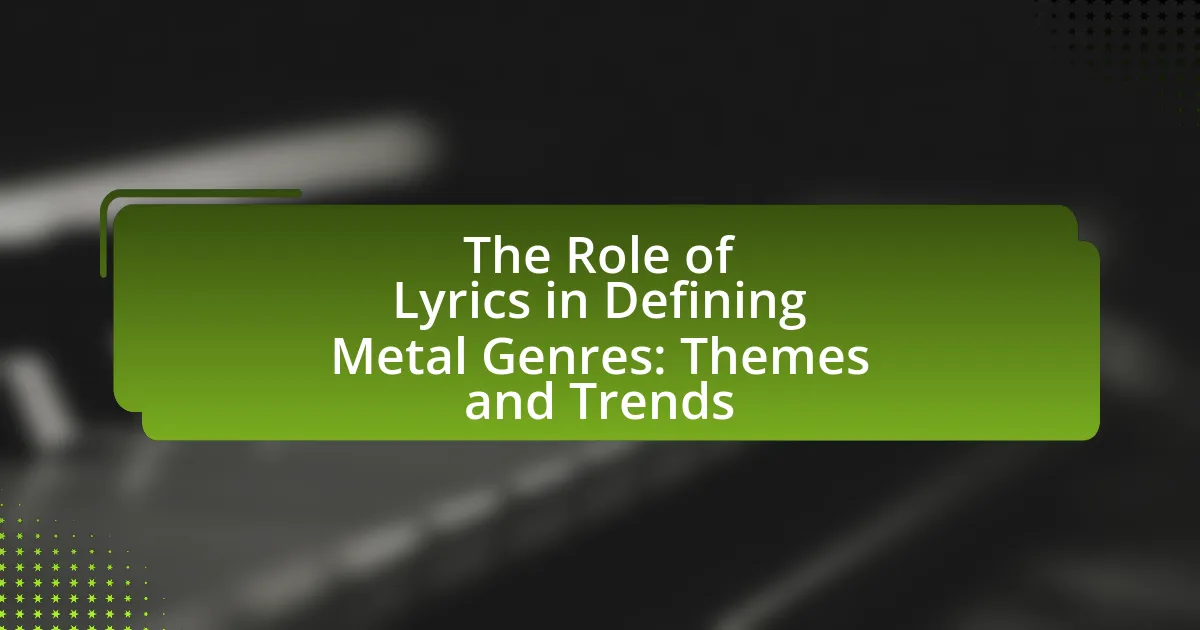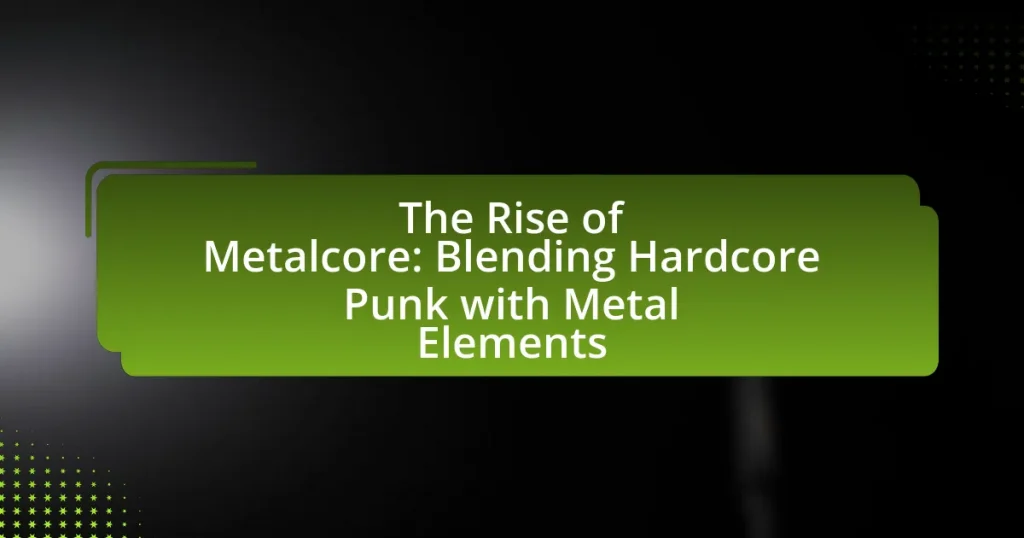The article examines the critical role of lyrics in defining various metal genres, highlighting how thematic content shapes the identity of subgenres such as heavy metal, black metal, death metal, and power metal. It explores common themes found in metal lyrics, including darkness, rebellion, mythology, and existentialism, and discusses how these themes resonate with listeners and foster emotional connections. Additionally, the article analyzes the evolution of lyrical content over time, reflecting societal changes and emerging trends in contemporary metal, such as mental health awareness and social issues. By understanding the interplay between lyrics and genre identity, readers gain insight into the diverse landscape of metal music and its cultural significance.
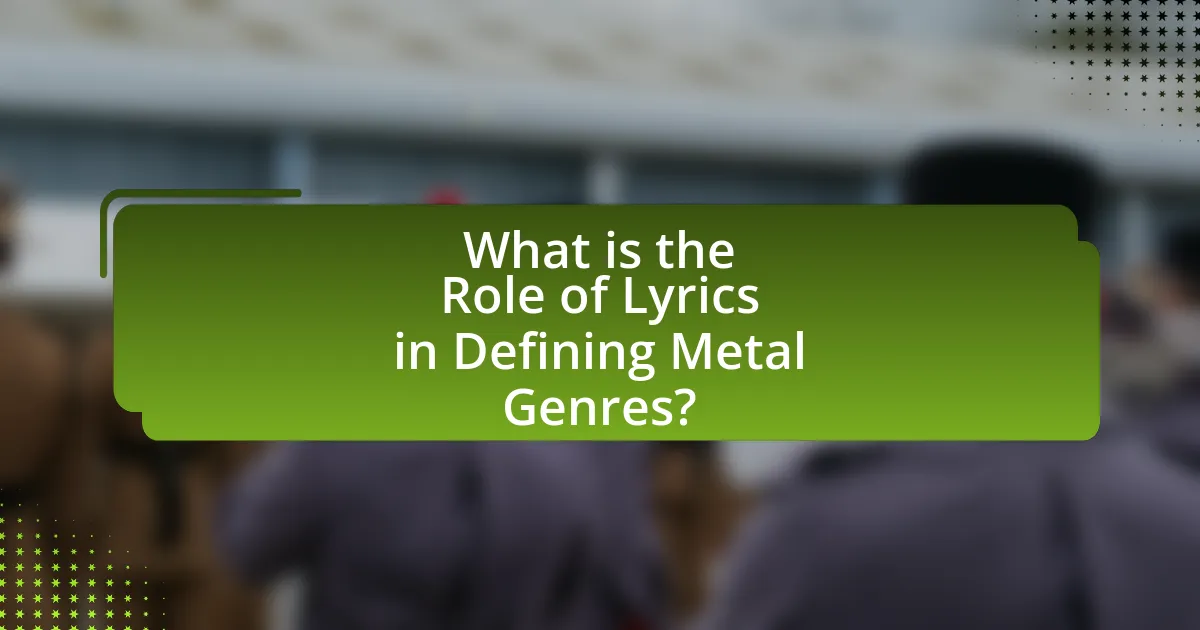
What is the Role of Lyrics in Defining Metal Genres?
Lyrics play a crucial role in defining metal genres by conveying thematic content that aligns with specific subgenres. For instance, heavy metal often explores themes of rebellion and personal struggle, while black metal frequently delves into darkness, nature, and anti-religious sentiments. The lyrical content not only reflects the musical style but also shapes the identity of the genre, as seen in death metal’s focus on graphic violence and horror, which distinguishes it from power metal’s more fantastical and heroic narratives. This thematic differentiation is essential for fans and critics alike, as it helps categorize and understand the diverse landscape of metal music.
How do lyrics influence the identity of different metal genres?
Lyrics significantly influence the identity of different metal genres by shaping thematic content and emotional resonance. For instance, heavy metal often explores themes of rebellion and personal struggle, while black metal delves into darkness, nature, and existentialism, reflecting its roots in Scandinavian folklore and philosophy. The lyrical content not only defines the genre’s aesthetic but also connects with the audience’s experiences and beliefs, creating a sense of community among fans. Furthermore, studies have shown that specific lyrical themes, such as violence in death metal or fantasy in power metal, help to categorize and differentiate these subgenres, reinforcing their unique identities within the broader metal landscape.
What themes are commonly explored in metal lyrics?
Common themes explored in metal lyrics include darkness, rebellion, mythology, and existentialism. Metal lyrics often delve into dark and aggressive subjects, reflecting feelings of anger and frustration, which resonate with listeners seeking an outlet for their emotions. Additionally, many metal songs draw on mythology and fantasy, using imagery from ancient tales and folklore to create a sense of epic storytelling. Existential themes, such as the search for meaning and the human condition, are also prevalent, prompting listeners to reflect on their own lives. These thematic elements are supported by the genre’s history, with bands like Black Sabbath and Iron Maiden incorporating such motifs into their music, establishing a foundation for the exploration of these themes in metal.
How do lyrical styles vary across metal subgenres?
Lyrical styles in metal subgenres vary significantly, reflecting distinct themes and cultural influences. For instance, black metal often features themes of darkness, nature, and anti-religion, characterized by poetic and atmospheric lyrics, as seen in bands like Mayhem and Burzum. In contrast, power metal typically emphasizes fantasy, heroism, and epic narratives, with uplifting and grandiose lyrics, exemplified by bands such as Blind Guardian and Helloween. Thrash metal focuses on social and political issues, delivering aggressive and direct lyrics, as demonstrated by bands like Slayer and Megadeth. Additionally, death metal employs graphic and often grotesque imagery, exploring themes of mortality and violence, with bands like Cannibal Corpse showcasing this style. Each subgenre’s lyrical approach not only defines its identity but also resonates with its audience, illustrating the diverse landscape of metal music.
Why are lyrics considered essential in metal music?
Lyrics are considered essential in metal music because they convey complex themes and narratives that resonate with the genre’s identity. Metal lyrics often explore topics such as personal struggle, societal issues, mythology, and existentialism, which are integral to the emotional and thematic depth of the music. For instance, bands like Metallica and Iron Maiden have used storytelling in their lyrics to address historical events and personal experiences, enhancing the listener’s connection to the music. This lyrical focus not only distinguishes metal from other genres but also fosters a sense of community among fans who relate to these themes.
What emotional connections do lyrics create for listeners?
Lyrics create deep emotional connections for listeners by evoking feelings of nostalgia, empathy, and catharsis. These connections arise from the relatability of themes such as love, loss, and struggle, which resonate with personal experiences. For instance, studies show that music with poignant lyrics can trigger emotional responses, leading to increased feelings of happiness or sadness, depending on the content. Research by the University of Southern California found that lyrics that tell a story or express vulnerability can foster a sense of belonging and understanding among listeners, enhancing their emotional engagement with the music.
How do lyrics contribute to the storytelling aspect of metal?
Lyrics in metal significantly enhance the storytelling aspect by providing vivid narratives and emotional depth that resonate with listeners. These lyrics often explore complex themes such as mythology, personal struggles, and societal issues, allowing bands to create immersive worlds and characters. For instance, bands like Iron Maiden utilize historical and literary references in their songs, such as “The Trooper,” which narrates a battle scene inspired by the Charge of the Light Brigade, effectively transporting listeners into the story. This narrative technique not only engages the audience but also fosters a deeper connection to the music, as the lyrics serve as a vehicle for conveying the band’s artistic vision and emotional experiences.
What trends can be observed in metal lyrics over time?
Metal lyrics have evolved significantly over time, reflecting changes in societal issues, personal struggles, and musical influences. In the early years of metal, particularly in the 1970s and 1980s, lyrics often focused on themes of rebellion, fantasy, and mythology, as seen in the works of bands like Black Sabbath and Iron Maiden. As the genre progressed into the 1990s and 2000s, there was a noticeable shift towards more introspective and personal themes, addressing topics such as mental health, existentialism, and social issues, exemplified by bands like Metallica and Slipknot.
Additionally, the rise of subgenres such as death metal and black metal introduced darker and more aggressive lyrical content, often exploring themes of violence, death, and anti-religious sentiments. This trend can be observed in the lyrics of bands like Cannibal Corpse and Mayhem. In recent years, there has been a resurgence of political and environmental themes in metal lyrics, reflecting global concerns, as seen in the works of bands like System of a Down and Gojira.
Overall, the evolution of metal lyrics showcases a dynamic interplay between personal expression and broader societal commentary, adapting to the changing cultural landscape while maintaining the genre’s core elements.
How have societal changes influenced metal lyrics?
Societal changes have significantly influenced metal lyrics by reflecting the cultural, political, and social issues of their times. For instance, the rise of anti-establishment sentiments in the 1980s led to lyrics that critiqued authority and societal norms, as seen in bands like Metallica and Slayer, whose songs often addressed themes of war, injustice, and personal struggle. Additionally, the emergence of movements such as feminism and LGBTQ+ rights in recent decades has prompted metal artists to explore themes of identity and empowerment, as exemplified by bands like Arch Enemy and Ghost. These shifts in lyrical content demonstrate how metal music serves as a mirror to societal evolution, capturing the zeitgeist and resonating with listeners’ experiences and emotions.
What role does cultural context play in shaping metal lyrics?
Cultural context significantly influences the themes and narratives found in metal lyrics. Metal music often reflects societal issues, historical events, and cultural beliefs, allowing artists to express their perspectives on topics such as war, politics, and personal struggles. For instance, the emergence of thrash metal in the 1980s coincided with political unrest and economic challenges in the United States, leading bands like Metallica and Slayer to address themes of disillusionment and aggression in their lyrics. Additionally, regional variations in metal, such as Scandinavian black metal, often incorporate local folklore and mythology, further demonstrating how cultural context shapes lyrical content. This interplay between culture and lyrics not only defines the genre but also resonates with audiences who share similar experiences or values.
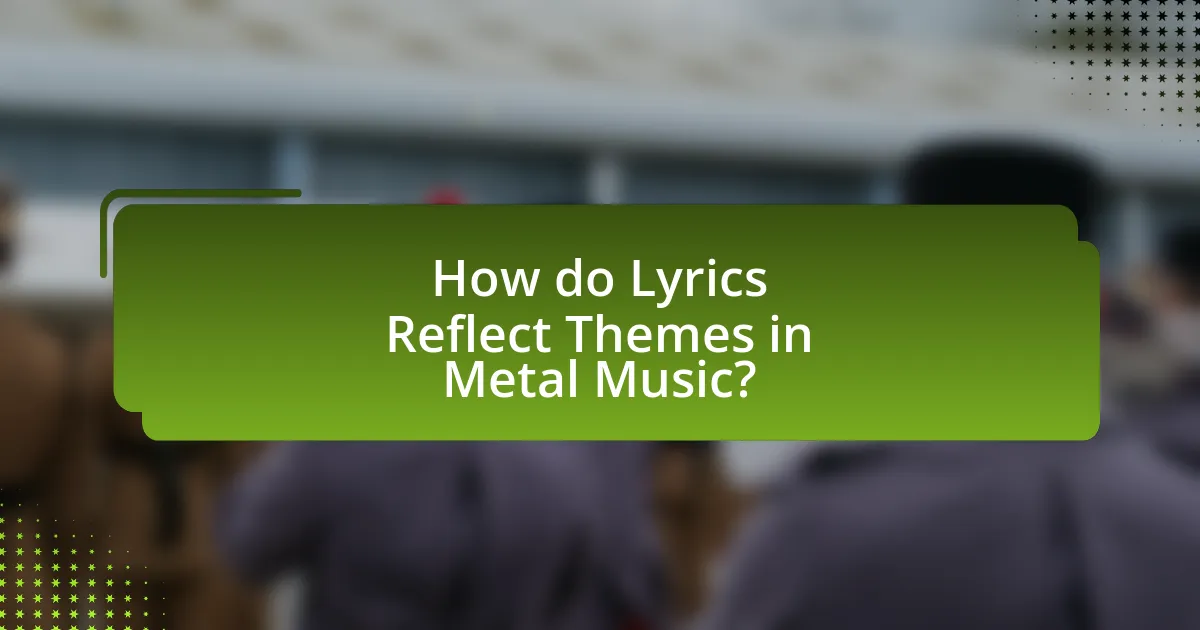
How do Lyrics Reflect Themes in Metal Music?
Lyrics in metal music often reflect themes of darkness, rebellion, and existential struggles. These themes are expressed through vivid imagery, storytelling, and emotional intensity, which resonate with listeners’ experiences and societal issues. For instance, bands like Black Sabbath and Metallica address topics such as war, mental health, and personal conflict, showcasing the genre’s capacity to explore complex human emotions and societal critiques. The use of metaphor and allegory in lyrics further enhances the thematic depth, allowing for multiple interpretations and connections to real-world events, such as the Vietnam War in Metallica’s “One.” This alignment of lyrical content with thematic exploration solidifies metal music’s role as a medium for expressing profound and often challenging ideas.
What are the predominant themes found in metal lyrics?
Predominant themes found in metal lyrics include darkness, rebellion, fantasy, and existentialism. These themes often explore human emotions, societal issues, and mythological narratives. For instance, many metal songs address topics such as personal struggle, anti-establishment sentiments, and the supernatural, reflecting a deep engagement with both personal and collective experiences. The use of vivid imagery and complex narratives in metal lyrics serves to enhance these themes, making them resonate with listeners.
How do themes of rebellion manifest in metal lyrics?
Themes of rebellion manifest in metal lyrics through expressions of defiance against authority, societal norms, and personal struggles. Metal lyrics often feature narratives that challenge political systems, critique social injustices, and explore themes of alienation and empowerment. For example, bands like Rage Against the Machine explicitly address anti-establishment sentiments, while Metallica’s “Fight Fire with Fire” reflects a response to existential threats and societal chaos. These lyrical themes resonate with listeners who identify with feelings of disenfranchisement, reinforcing the genre’s association with rebellion and resistance.
What role do fantasy and mythology play in metal lyrics?
Fantasy and mythology serve as significant thematic elements in metal lyrics, often providing a rich narrative backdrop that enhances the genre’s dramatic and emotional intensity. These themes allow metal artists to explore complex ideas such as heroism, conflict, and existentialism, often drawing from historical and literary sources. For instance, bands like Blind Guardian and Nightwish frequently incorporate mythological figures and epic tales, which not only enrich their storytelling but also resonate with listeners who appreciate the depth and imagination behind the lyrics. This use of fantasy and mythology in metal has been documented in various analyses, highlighting how these themes contribute to the genre’s identity and appeal.
How do lyrics address personal and social issues in metal?
Lyrics in metal music often address personal and social issues by exploring themes of alienation, mental health, and societal injustices. For instance, bands like Metallica and Slipknot have tackled topics such as depression and trauma, reflecting the struggles of individuals in a harsh world. Additionally, metal lyrics frequently critique political systems and social norms, as seen in songs by bands like Rage Against the Machine, which confront issues like inequality and corruption. This thematic focus not only resonates with listeners but also serves as a form of catharsis and empowerment, allowing fans to confront their own experiences and societal challenges through the music.
What mental health themes are prevalent in metal lyrics?
Mental health themes prevalent in metal lyrics include depression, anxiety, existentialism, and trauma. These themes often reflect the struggles and emotional turmoil experienced by individuals, resonating with listeners who may face similar challenges. For instance, studies have shown that metal music frequently addresses feelings of isolation and despair, with lyrics that articulate personal battles and societal issues. Research by Dr. Emmanuelle B. P. Dufour in “The Psychology of Heavy Metal Music” highlights how these themes serve as a cathartic outlet for both artists and fans, fostering a sense of community and understanding among those dealing with mental health issues.
How do lyrics tackle political and social commentary in metal?
Lyrics in metal tackle political and social commentary by addressing issues such as war, inequality, and corruption. Bands like Metallica and Slayer have used their lyrics to critique government actions and societal injustices, exemplified in songs like “One” and “Angel of Death,” which reflect on the horrors of war and the consequences of violence. This genre often employs aggressive language and imagery to provoke thought and inspire change, making it a powerful medium for expressing dissent and raising awareness about critical issues. The direct engagement with these themes has established metal as a voice for the marginalized and a platform for social critique.
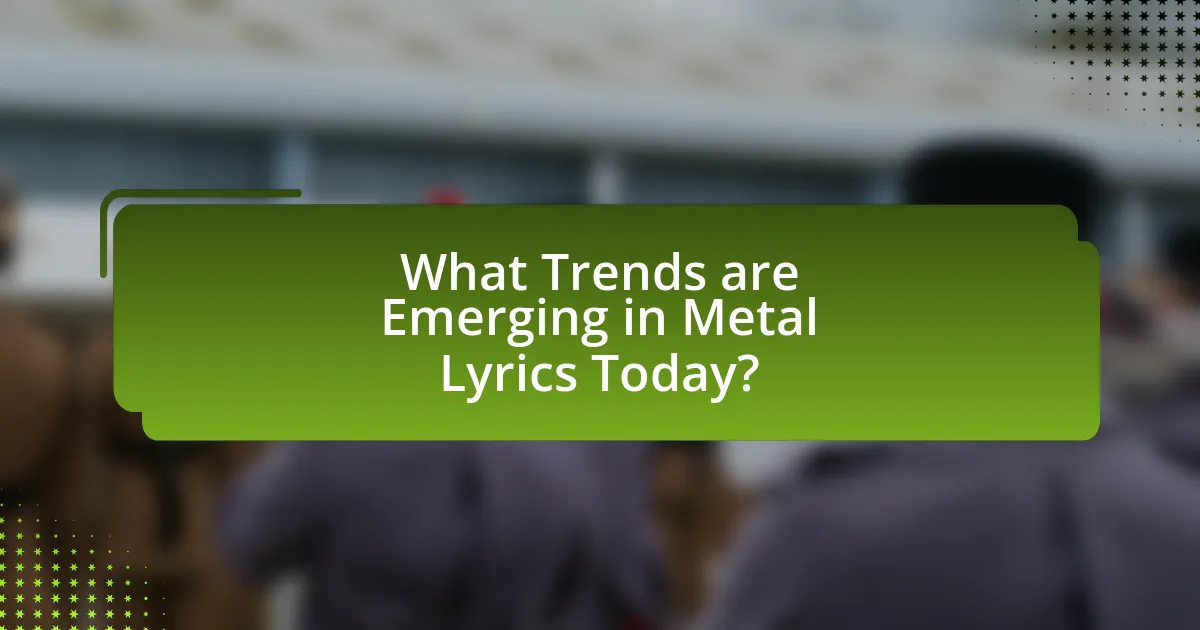
What Trends are Emerging in Metal Lyrics Today?
Emerging trends in metal lyrics today include a focus on mental health, social issues, and personal introspection. Many contemporary metal bands are addressing topics such as anxiety, depression, and societal injustices, reflecting a shift from traditional themes of violence and fantasy. For instance, bands like Spiritbox and Architects have incorporated discussions about mental health struggles and existential crises into their lyrics, resonating with a broader audience. This trend is supported by the increasing prevalence of mental health awareness in society, which has influenced artists to explore these themes more openly in their music.
How are modern metal bands evolving their lyrical content?
Modern metal bands are evolving their lyrical content by incorporating diverse themes such as mental health, social issues, and personal experiences. This shift reflects a broader cultural awareness and a desire to connect with listeners on a deeper level. For instance, bands like Architects and Spiritbox address topics like grief and trauma, moving away from traditional themes of fantasy and violence that characterized earlier metal. This evolution is supported by the increasing prevalence of mental health discussions in society, as evidenced by studies showing that 1 in 5 adults experience mental illness, prompting artists to explore these subjects in their music.
What new themes are being introduced in contemporary metal lyrics?
Contemporary metal lyrics are introducing themes such as mental health awareness, social justice, and environmental concerns. These themes reflect a shift from traditional subjects like violence and fantasy to more personal and societal issues. For instance, bands like Spiritbox and Architects address mental health struggles and the impact of societal pressures, while other groups focus on climate change and activism, showcasing a broader range of emotional and political engagement in the genre. This evolution in lyrical content indicates a response to current global challenges and a desire for deeper connection with listeners.
How is technology influencing the way lyrics are written and shared?
Technology is significantly influencing the way lyrics are written and shared by providing new tools for collaboration and distribution. Digital platforms enable songwriters to collaborate in real-time across geographical boundaries, utilizing software like Google Docs or specialized music apps, which enhances creativity and efficiency in the writing process. Furthermore, social media platforms such as Instagram, TikTok, and YouTube allow artists to share their lyrics instantly with a global audience, facilitating immediate feedback and engagement. According to a 2021 report by the International Federation of the Phonographic Industry, 70% of music consumers discover new music through social media, highlighting the impact of technology on the sharing process. This shift not only democratizes access to music but also influences lyrical themes, as artists respond to trends and audience interactions in real-time.
What can listeners learn from the evolution of metal lyrics?
Listeners can learn about the changing themes and societal influences reflected in metal lyrics over time. The evolution of metal lyrics showcases a shift from early themes of fantasy and rebellion in the 1970s, as seen in bands like Black Sabbath, to more complex subjects such as personal struggles, politics, and social issues in the 1980s and 1990s, exemplified by bands like Metallica and Slayer. This progression illustrates how metal lyrics have adapted to cultural contexts, addressing topics like mental health, identity, and existentialism, which resonate with listeners’ experiences. The lyrical evolution also highlights the genre’s ability to challenge norms and provoke thought, making it a powerful medium for expression and commentary on contemporary issues.
How can fans engage with the lyrical themes of their favorite bands?
Fans can engage with the lyrical themes of their favorite bands by analyzing the lyrics, participating in discussions, and creating fan art or covers that reflect those themes. Analyzing lyrics allows fans to interpret the messages and emotions conveyed by the band, fostering a deeper connection to the music. Participating in discussions on social media platforms or fan forums enables fans to share their interpretations and insights, enhancing their understanding of the themes. Additionally, creating fan art or covers inspired by the lyrics can serve as a personal expression of how those themes resonate with them, further solidifying their engagement with the band’s work.
What are some best practices for analyzing metal lyrics?
Best practices for analyzing metal lyrics include examining thematic elements, understanding cultural context, and exploring linguistic devices. Thematic analysis involves identifying recurring motifs such as rebellion, darkness, and existentialism, which are prevalent in metal music. Understanding the cultural context is crucial, as many metal lyrics reflect societal issues, personal struggles, or historical events, enhancing the listener’s connection to the music. Additionally, exploring linguistic devices like metaphor, alliteration, and imagery can reveal deeper meanings and artistic intentions behind the lyrics. These practices are supported by studies that highlight the significance of lyrical content in shaping the identity of metal genres, such as the work by Walser (1993) in “Running with the Devil,” which discusses the interplay between lyrics and genre classification.
